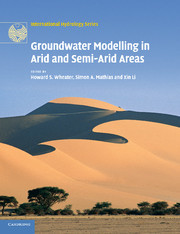Description
Groundwater Modelling in Arid and Semi-Arid Areas
International Hydrology Series
Coordinators: Wheater Howard S., Mathias Simon A., Li Xin
This book provides state-of-the-art guidance on groundwater modelling to meet the challenges of water management in arid and semi-arid areas.
Language: English
Subject for Groundwater Modelling in Arid and Semi-Arid Areas:
Groundwater Modelling in Arid and Semi-Arid Areas
Publication date: 02-2014
Support: Print on demand
Publication date: 02-2014
Support: Print on demand
Groundwater modelling in arid and semi-arid areas
Publication date: 09-2010
150 p. · 22.5x28.4 cm · Hardback
Publication date: 09-2010
150 p. · 22.5x28.4 cm · Hardback
Description
/li>Contents
/li>Biography
/li>
Arid and semi-arid regions face major challenges in the management of scarce freshwater resources under pressures of population, economic development, climate change, pollution and over-abstraction. Groundwater is commonly the most important water resource in these areas. Groundwater models are widely used globally to understand groundwater systems and to guide decisions on management. However, the hydrology of arid and semi-arid areas is very different from that of humid regions, and there is little guidance on the special challenges of groundwater modelling for these areas. This book brings together the experience of internationally leading experts to fill a gap in the scientific and technical literature. It introduces state-of-the-art methods for modelling groundwater resources, illustrated with a wide-ranging set of illustrative examples from around the world. The book is valuable for researchers, practitioners in developed and developing countries, and graduate students in hydrology, hydrogeology, water resources management, environmental engineering and geography.
Preface H. S. Wheater, S. A. Mathias and X. Li; 1. Groundwater modelling in arid and semi-arid areas: an introduction S. A. Mathias and H. S. Wheater; 2. Hydrological processes, groundwater recharge and surface water-groundwater interactions in arid and semi-arid areas H. S. Wheater; 3. Conceptual models for recharge sequences in arid and semi-arid regions using isotopic and geochemical methods W. M. Edmunds; 4. Groundwater flow and transport J. Carrera and S. A. Mathias; 5. Performing unbiased groundwater modelling: application of the theory of regionalized variables S. Ahmed, A. Nabi and S. Owais; 6. Groundwater vulnerability and protection A. Butler; 7. Variable density groundwater flow: from modelling to applications C. T. Simmons, P. Bauer-Gottwein, T. Graf, W. Kinzelbach, H. Kooi, L. Li, V. Post, H. Prommer, R. Therrien, C. Voss, J. Ward and A. Werner; 8. Sustainable water management in arid and semi-arid regions W. Kinzelbach, P. Brunner, A. von Boetticher, L. Kgotlhang and C. Milzow; Index.
Howard Wheater is Professor of Hydrology at Imperial College, London. He is past President of the British Hydrological Society, a Fellow of the Royal Academy of Engineering, a Fellow of the Institution of Civil Engineers, and is a life member of the International Water Academy. His research interests are in hydrology and water resources, with wide-ranging applications including climate change, surface and groundwater hydrology, floods, water resources, and water quality. He has published over 200 peer-reviewed papers and six books. Academic awards include various UK prizes and the 2006 Prince Sultan bin Abdulaziz International Prize for Water. He has been extensively involved in flood and water resource projects in the UK and internationally, providing advice to states and international governments. He has a particular interest in the hydrology of arid areas, and has worked in Oman, Saudi Arabia, Yemen, the United Arab Emirates, Jordan, Syria and Egypt, and Arizona. He chairs UNESCO's G-WADI arid zone water resources programme and was invited by the Japanese government to give a keynote address on water scarcity to the 2003 Kyoto World Water conference.
Simon Mathias holds a Lectureship in the Department of Earth Sciences at Durham University. Prior to this position he was active in the field of groundwater engineering as a researcher and lecturer within the Department of Civil and Environmental Engineering at Imperial College, London. His principal expertise lies in the development of mathematical models to describe flow and transport of reactive contaminants in porous and fractured porous media. Dr Mathias has worked on a broad range of applications including vadose zone transport of nutrients in fracture rock systems, plant uptake of radionuclides, aquifer characterisation studies, buoyancy driven flow problems, CO2 geo-sequestration and hydraulic fracture propagation. He has published widely in international peer-reviewed journals. Dr Mathias is an elected c
Simon Mathias holds a Lectureship in the Department of Earth Sciences at Durham University. Prior to this position he was active in the field of groundwater engineering as a researcher and lecturer within the Department of Civil and Environmental Engineering at Imperial College, London. His principal expertise lies in the development of mathematical models to describe flow and transport of reactive contaminants in porous and fractured porous media. Dr Mathias has worked on a broad range of applications including vadose zone transport of nutrients in fracture rock systems, plant uptake of radionuclides, aquifer characterisation studies, buoyancy driven flow problems, CO2 geo-sequestration and hydraulic fracture propagation. He has published widely in international peer-reviewed journals. Dr Mathias is an elected c
© 2024 LAVOISIER S.A.S.




